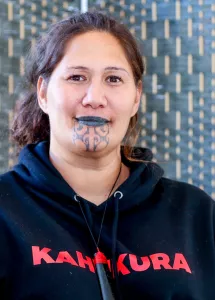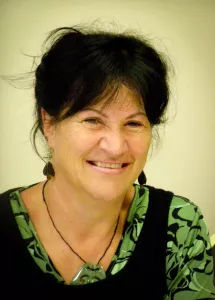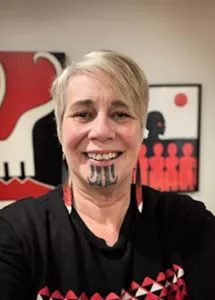
MBChB, Dip Nutrition, FRACP
Dr Kirsty Macfarlane is a leading Māori gastroenterologist, researcher, and māmā whose work is grounded in equity, whakapapa, and the power of kaupapa Māori. Of Ngāpuhi descent, Kirsty brings clinical excellence and cultural integrity to every space she enters—whether it’s a rural hospital, policy table, or whānau consultation.
Kirsty holds a Diploma in Nutrition (2006), a Bachelor of Medicine and Surgery from the University of Auckland (2014), and became a Fellow of the Royal Australasian College of Physicians in 2022, specialising in gastroenterology. She has since completed two advanced fellowships—one in inflammatory bowel disease (IBD) at the Royal Adelaide Hospital and another in gastrointestinal ultrasound, gaining full accreditation in 2024.
Currently practising at both Whangārei Hospital and the MacMurray Centre in Tāmaki Makaurau, Kirsty is dedicated to delivering specialist care to Te Tai Tokerau—an area where gastroenterology services were once non-existent. “Working where my whānau come from gives me purpose,” she says, reflecting her commitment to returning home to uplift her people.
A former Chair of the NZ Society of Gastroenterology Equity Working Group (2022–2023), Kirsty has led national strategies to embed equity into clinical training and service delivery. Her research interests include IBD, adolescent health transitions, gut-brain disorders, Coeliac disease, and culturally appropriate diagnostics. She speaks conversational Te Reo Māori and German, enhancing her ability to build meaningful relationships across diverse communities.
As a mother of three tamariki raised in Te Reo Māori and immersed in tikanga, Kirsty embodies the intergenerational strength of Māori wāhine. She continues to speak at national wānanga, mentor Māori trainees, and influence systemic reform with clarity, humility, and unwavering mana.
“Equity in medicine isn’t a vision—it’s the daily practice of listening, learning, and serving. Our people deserve care that honours their whole selves—tinana, wairua, hinengaro, and whānau.”
With every patient, presentation, and policy submission, Dr Macfarlane carries the hopes of her tīpuna and the aspirations of future Māori doctors. She is proof that excellence in medicine can and must walk alongside tikanga Māori.
Links:
RACP Aotearoa New Zealand Māori Health Committee
Equity Working Group Report Dr Kirsty MacFarlane Report p 24
RACP Aotearoa New Zealand Māori Trainee Wānanga and Health Hui Trainee Wananga Speaker. 30 August 2024
05 June 2025



